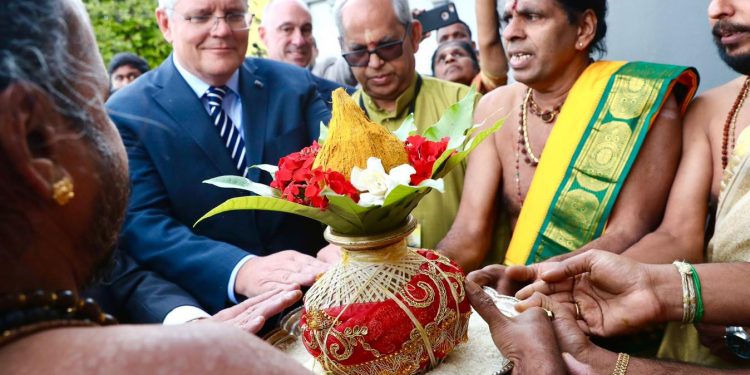On the 2nd of September, 2021, the Victorian state government, criminalised the display of Nazi symbols, including the Nazi Swastika. The Swastika, however, predates the Nazi Swastika as a symbol of religious significance. It has been documented as a symbol of significance not just to the theistic Vedic faith but to atheistic (Sramanic) faiths such as Jainism and Buddhism as well.
This fact is key to understanding the response to the proposed new law. Especially the response from Indian-Australian communities. Here is a preliminary response published in the national public broadcaster, SBS, on the 7th of September, 2021. You don’t have to scroll too far down this news piece though, to reach the problematic stuff. And there is problematic stuff aplenty in the piece. The sub-heading of the piece, in just one sentence, commits two glaring errors:
‘The Indian community in Australia fears practising Hindus could be mistakenly targeted because their pious swastika symbol bears a striking resemblance to the one used by Nazis.’
Now, who has appointed Hindu-identifying people as the spokespeople for the entire “Indian community”? Why do publications, including national ones, keep making this error that conveniently conflates all Indians as Hindu-identifying? We will circle back to answering these questions a little later.
Let’s address the second error in the sub-heading before that – ‘the pious swastika symbol bears a striking resemblance to the one used by Nazis’. This isn’t true. It is actually the other way around. It is the Nazi Swastika that bears resemblance to the Swastika symbol. It might seem like we are splitting hairs here. However, this contextual distinction is important, because in conjunction with the first error, this response re-enforces a falsehood – that the Swastika comes from an “ancient” culture that can historically be termed “Indian”, and that all Indians are essentially Hindus.
India, as a nation state, has only existed for 74 years now. Immediately prior to which, the South Asian subcontinent was a composite of British controlled territories, and 500-plus dependent imperial states. Each with their own linguistic and regional diversity. India as a national identity, thus, has only existed for a little less than a century now. The Vedic faith, Buddhism, and Jainism pre-date “India” and the Nazi ideology, by at least two millennia.
The ban itself follows from a March 3rd (2021) inquiry report into anti-vilification protections. It is interesting that the community response from the Australia/Israel & Jewish Affairs Council (AIJAC) actually acknowledges ‘considered exceptions to the prohibition’ (on March 3rd, 2021). The ban, in fact, hasn’t even been introduced as a legislation yet. It is expected to come into effect in early 2022. Victoria’s Attorney-General Jaclyn Symes, has also clarified that they ‘are aware of the use of Swastika by other religions’. She has also laid out a plan for later this year – that community consultations ‘would determine how broadly the ban would be applied’.
Also read: Caste and Cricket: How Celebrities Enable Inequality.
However, it is still a valid concern that has been articulated by Mr Karthik Arasu here in an ABC news-piece – under the subheading ‘Hindus highlight basic difference’. That ‘they will… be threatened that someone will penalise or report them [for using the Swastika]’.
However, as established earlier, the Swastika-ban is also a Buddhist and Jain concern. Then why weren’t Buddhist and Jain community representatives approached for a statement by the ABC and the SBS? Did the Buddhists and the Jains likely pay more heed to the announcements made by Symes and the AIJAC? Or were the announcements somehow different for them? Was it separately clarified to them that the government is aware of the significance of the Swastika to them?
Is religious hatred in Australia, against Indian-origin people, only targeted at Hindu identifying communities? We ran a news-search query to ascertain this. The query crawled Australian news archives for acts of structural or spontaneous religious hatred towards Indians in Australia. We came across numerous acts of xenophobia committed targeting people of South Asian races, but none of them showed a direct connection to the victim(s) being targeted for being Hindu. In fact, the most recent hate-crime against a community of South Asian origin in Australia was against the Sikhs. Committed by Vishal Jood, a Hindu man, who pled guilty to the charge of targeted religious hatred and was convicted and imprisoned (and later deported).
This begs the question then – who stands to gain from this conflation of Hindus with all Indians? Who is spear-heading this narrative? And are they even qualified as theologists to speak on complex matters of scriptural religious significance?
Let’s start with Mr. Karthik Arasu who was approached for comment and was quoted in the ABC piece linked here. Mr Arasu is identified in the piece as the convener of the Hindu Temples Council in Australia. It is important to note though, that Mr Arasu is not a qualified Hindu theologist. Mr Arasu, per his LinkedIn profile, is a business broker at a firm called Benchmark Business Sales & Valuation. He is also known for being ‘the first Indian-born independent senate candidate from Victoria in [the] Australian Federal Elections, [of] 2016’. His election campaign, as stated by his campaign manager in a 2016 article for a national Indian newspaper, was in fact digitally managed from India. Arasu’s profile image in the same article, is of him speaking at a gathering organised by the Vishwa Hindu Parishad. A global body that has been tangibly linked, time and again, with the current ruling establishment back in India – the BJP. This should be ringing alarm bells for everyone that holds the sanctity of the Australian democratic process in high regard. A person, with clear possible links to the party currently in power in India, hasn’t just run for an Australian federal election. They have also given recent statements that play into the illusion that all Indians are Hindus – a conflation that is the central ideology of the ruling party in India.
Centre-staging Hinduism as the primary faith of the Indian state, has been a manifesto-item for the BJP for decades now. This homogenisation of the pluralism of people of Indian origin, is something that even the Australian PM has been called out for. Scott Morrison, at his August 4 visit to the Sri Shiva Vishnu Temple in Melbourne last year, thanked the ‘broader Indian community’ standing on-stage at a Hindu place of worship. The conflation of all Indians to Hindus was glaringly obvious to everyone that understands how this process operates. Time and again national broadcasters in Australia have sought spokespeople with direct and tangible links to the BJP to represent the Indian community in cross-faith discussions.
Also read: Are you apolitical? Why?
Hemanshu Pota, who was quoted in this SBS piece explaining the religious significance of the Swastika to Hindus, is an engineer by qualification. He has also been an academic for the Australian Defence Force Academy at the University of New South Wales. He has no theological or religious-studies qualifications to speak on such matters. However, he has often been the official spokesperson for the Hindu Council of Australia (HCA). A religious association that has direct ties with an organisation that calls itself the Overseas Friends of the BJP (OFTB). Together, the HCA and the OFTB, were actively involved in hosting the Prime Minister of India at an unofficial welcome-to-Australia at the Allphones Arena, in Sydney, in 2014. The Indian PM, a member of the BJP and a self-proclaimed Hindu Nationalist, was welcomed at the event by close to 16,000 people. 10,000 of which were given tickets to the event for free by the organising body.
Makarand Bhagwat, the other spokesperson reached-out-to by the SBS for their Swastika response-piece, is a colleague of Hemanshu Pota at the Hindu Council. Mr Bhagwat, again, is a mechanical engineer by qualification, and a project management professional by vocation. This begs a question. How institutionally invested are the ABC and the SBS in their ethics of journalism? It is grossly unethical that their sources are speaking on matters that they have no expertise on other than identifying with the faith under discussion. It is also quite clear that their understanding of Indian communities that might hold the Swastika sacred is limited to “Hindus” of a particular kind. The kind with legitimate connections to a political ideology that believes in supremacy of the Hindu faith in the subcontinent.
Invisibilisation of Buddhist communities, and other faiths of atheistic traditions in (and from) India, through the process of categorising them as “Hindus” is an exclusionary orthodoxy that has played out seamlessly in this entire debate. Institutional multiculturalism in Australia seemingly has no built-in competency to differentiate between nation-states and religious diversity. To an extent, this can also be pinned on the political laziness that ails leaders on both sides of the political divide in Australia. This is why it is so important to applaud the AIJAC and the Victorian government for acknowledging a clear willingness to consult with people of other religions in their statements to the public. However, it is also important then to understand the motivation behind the most vocal Hindu community-reps pre-emptively centre-staging themselves as the spokespeople for all Indians.
An obvious dalliance between the ruling Indian state-establishment, and self-appointed arbitrators of the Hindu religion in Australia is being enabled by the “multicultural” Australian media and politics. It is actively hijacking interfaith dialogues to build profile for its participants. It is also creating inadvertent orthodoxies that are invisibilising other Indian minorities. Without doubt, the Nazi Swastika is a vile symbol of hate towards Jewish communities of all descents. Understanding and expressing sympathies with their marginalisation and abuse should be an honest process of agreement with mutual respect – with space being allowed for expression of valid reservations.
However, it should not be allowed to become a process of homogenisation on the part of the ones expressing their reservations. It should not enable exclusion of other Indian-origin cultures. Non-Hindus and their belief systems, in the “Indian” subcontinent, predate the constructed idea of India. They should, thus, be respected on those terms. Their sovereignty is as Indian as that of any other faith that has been practiced in what we now call India.
Authored by The Idea Sovereignty Project (TISP), a collective of Indian and Indian-origin writers who believe in speaking up for cultures that are being dispossessed of their dignity and sovereignty.) Authors can be reached at sovereignideaproject@gmail.com.
The views expressed in this article are those of the author/s and may not necessarily reflect the editorial views or position of NRI Affairs.











